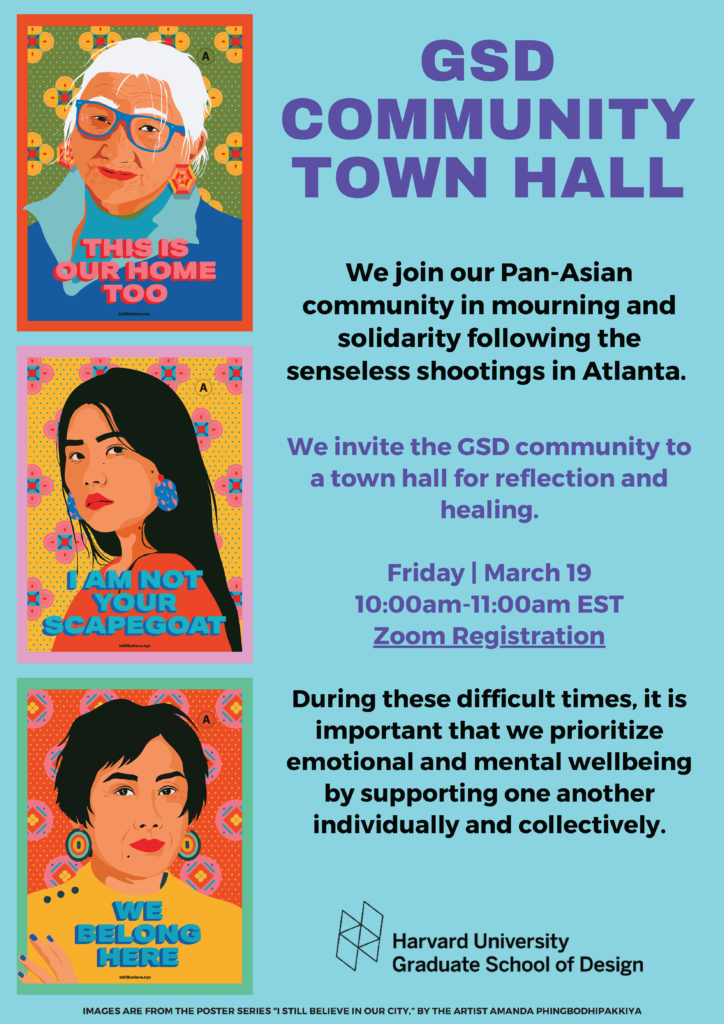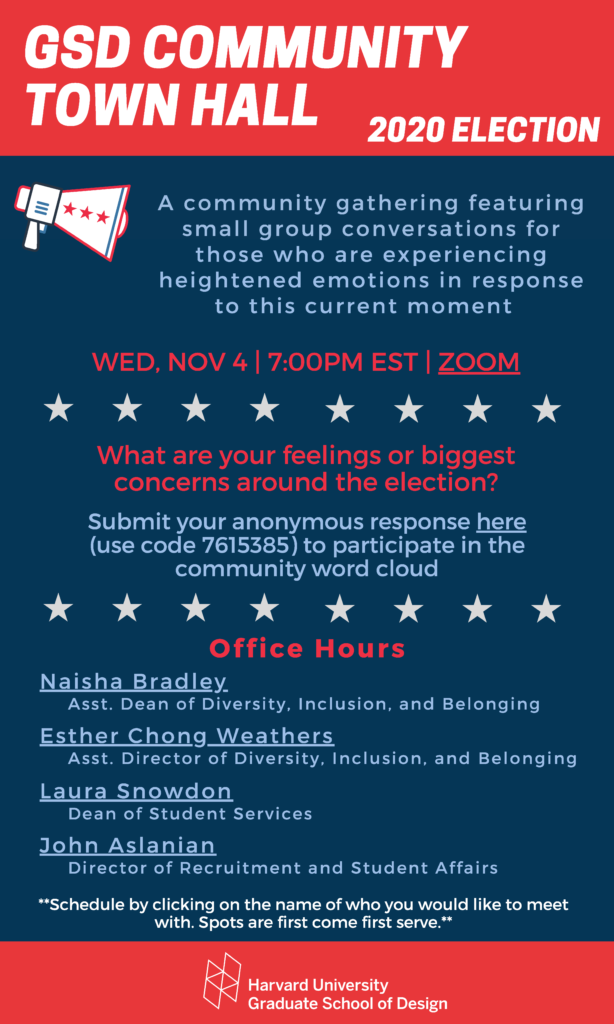Programming
The Office of Diversity, Inclusion, and Belonging works in partnership with various GSD and Harvard University offices, as well as experts in the field to provide programs that foster a design community that can hold multiple identities and conflicting perspectives in an engaging and respectful way.
2024 - 2025 Upcoming Events
-
Finals Drop-In
Join us for the DIB Finals Drop-In! This spring, the Office of Diversity, Inclusion, and Belonging is excited to offer our enhanced initiative designed to give you a much-needed break during finals week. Take a moment to unwind in our welcoming space, where you can customize a snack bag that caters to your dietary needs. Whether you need a quiet moment or a quick snack, we’re here to support you. All students are welcome!-
10:30 AM -12:30 PM, Gund 318
-
2024 - 2025 Past Events
-
Equity, Diversity, Inclusion, and Belonging (EDIB) 101 Workshop
The EDIB 101 Workshop will review common language and concepts used in equity, diversity, inclusion, and belonging efforts. Participants will explore, unpack, and deepen their understanding of how these terms play out in their professional and personal lives. This workshop will help participants learn strategies to enhance EDIB in daily work.-
11:00 AM - 12:30 PM
-
-
Equity, Diversity, Inclusion, and Belonging (EDIB) Forum
Join us on February 25 - 26 at Harvard's annual EDIB Forum, themed The Power of Community: Cultivating Bonds and Building Bridges. All Harvard affiliates are invited to join in-person and virtual sessions.-
Hybrid, Smith Campus Center (Floor 10)
-
-
Combatting Antisemitism with Nancy Koppelman
Dr. Nancy Koppelman from the Academic Engagement Network will share a history of antisemitism from its origins to today. This workshop offers an introductory exploration of antisemitism, equipping participants with the knowledge and tools to address antisemitism effectively.-
12 PM - 1:30 PM
-
-
Combatting Islamophobia with Khalil Abdur-Rashid
Imam Dr. Khalil Abdur-Rashid, the Muslim Chaplain at Harvard, will facilitate a discussion on ways we can combat Islamophobia. This workshop offers an introductory exploration of anti-Muslim bias, equipping participants with the knowledge and tools to address Islamophobia effectively.-
12 PM - 1:30 PM
-
-
Community Iftar
The Graduate and Professional Schools in Cambridge and Allston will be sponsoring Iftar Dinners for the entire Harvard Muslim graduate student community on campus, on Mondays, Tuesdays, and Wednesdays. Students will be required to RSVP for each day they will attend, as the different Schools will be sponsoring a different night.-
Student Organization Center at Hilles (SOCH)
-
-
Community Conversation: "Uniting Voices: The Art of Communication in a Time of Division"
In a time of growing social, political, and cultural divisions, effective communication across differences is more crucial than ever. This event will feature the Chief of Communications for the City of Boston, who will share insights and strategies for fostering understanding and connection in diverse communities. The conversation will focus on strategies for distilling complex messages into clear, concise language without losing meaning or alienating audiences. We will explore the role identity factors—such as race, gender, and culture—play in shaping communication and ensuring that all voices are included.-
11:00 AM - 12:00 PM
-
-
First-Generation Student Luncheon
This event, a collaboration between Career Services, Student Life, and the Office of Diversity, Inclusion, and Belonging (DIB), is designed to provide first-generation students with the tools, resources, and support they need to thrive both during their time at GSD and beyond!-
12:00 PM - 1:00 PM
-
-
Community Conversation: "Free Speech in the Academy: Limits and Liberties"
Free speech is a cornerstone of the academic enterprise, promoting diverse views and fostering the exchange of ideas. Yet, universities have a responsibility to regulate speech in ways that align with their educational missions. Join us and Cass R. Sunstein, Robert Walmsley University Professor, HLS, as we examine the dividing line between reasonable restrictions and impermissible infringements on free speech, and discuss how universities can create environments that both protect expression and uphold their institutional values.-
11:00 AM - 12:00 PM
-
Community Conversations
Community Conversation is an initiative for the GSD to informally engage with each other around topics that advance discussions about perspective, difference, and commonality. This ongoing initiative highlights one aspect of the intersecting quality of diversity, inclusion, and belonging at a time.
Designing for Equity Pryde in Aging (featuring Gretchen Van Ness)
This illuminating session with Gretchen Van Ness (Executive Director of The Pryde) explored the need and complexities of establishing spaces dedicated to supporting specific identities in today’s polarized socio-political environment amidst these evolving challenges. This event focused on the design and development journey of The Pryde, Massachusetts’ first LGBTQ-affirming housing for seniors, highlighting the unique challenges and solutions involved in its creation amid these shifting dynamics.
Reimagining Black Wall Street: Economic Stability, Mobility, and Prosperity (featuring Mavis Gragg and Segun Idowu)
In partnership with Mavis Gragg (Loeb Fellow 2024 and CEO of HeirShares, LLC) and Segun Idowu (City of Boston Chief of Economic Opportunity and Inclusion), we unpacked how Black business districts came to be in the U.S. context and what contemporary requisites are essential for building a Black Wall Street today. We discussed the necessary economic and legal opportunities to counter declining Black wealth and explored how to transition from short-term wealth accumulation to lasting intergenerational resilience.
Truth-Seeking: Restoring Incomplete Histories (featuring Ana María León Crespo)
“We can’t dismantle what we do not understand, and we can’t understand the contemporary injustice we face unless we reckon honestly with our history.” – Tomiko Brown-Nagin, Dean of Radcliffe Institute
“Truth-Seeking: Restoring Incomplete Histories” focused on the importance of truth-seeking as a vehicle to uncover and restore incomplete histories. Building on the themes from the Harvard & The Legacy of Slavery Report, we discussed the role of the canon in perpetuating contemporary injustice and explored avenues for restoration.
This Conversation featured Ana María León Crespo, the GSD’s Associate Professor of Architecture.
Creative Placemaking: Building Transformative Coalitions (featuring Kara Elliott-Ortega)
The Office of Diversity, Inclusion, and Belonging, in partnership with Boston’s Chief of Arts and Culture, Kara Elliott-Ortega, explored the healing power of coalition-building in the face of long-standing artistic displacement. This Community Conversation discussed the significance of creative placemaking and strategic partnership in addressing histories of inequity.
Voter Suppression in the Built Environment (featuring Kristen McCosh and Patricia Mendez)
Thirty years after the Americans with Disabilities Act (ADA), 60% of polling places still have impediments that prohibit people with disabilities from accessing the polls. While the pandemic created inclusive voter engagement through absentee ballot drop-off boxes and curbside voting, there are currently more than 400 bills in 49 states that would restrict access to voting for people with disabilities. This conversation explored how the built environment disenfranchises disabled voters and what can be done to ensure all can participate in democracy.
“Voter Suppression in the Built Environment” featured Commissioner Kristen McCosh, the Disability Commissioner and ADA Title II Coordinator for the City of Boston.
Memory Institutions as a Site for Reckoning, Repair, and Reimagination (featuring Shamichael Hallman and Jerome Offord Jr.)
Building on the Harvard & The Legacy of Slavery Report, this event focused on memory institutions as a site for reckoning, repair, and reimagination. Participants explored the power dynamics of memory institutions as cultural knowledge sites, examined reparative approaches to disrupting homogeneous histories, and reimagined these sites as inclusive community spaces.

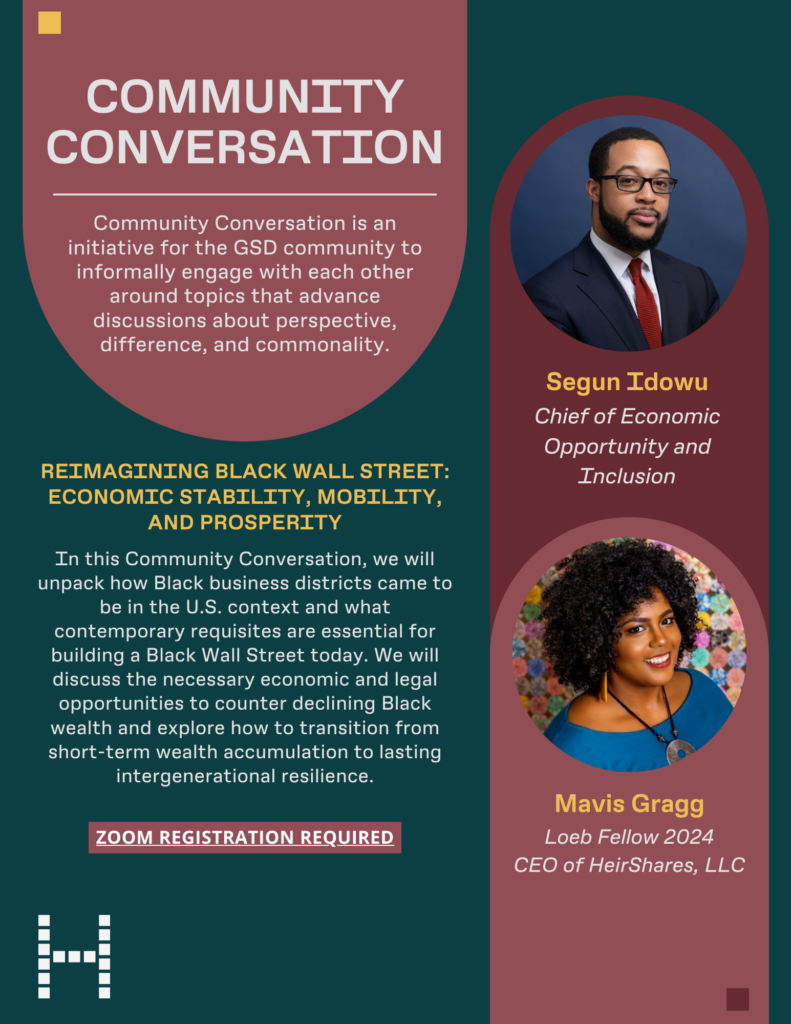
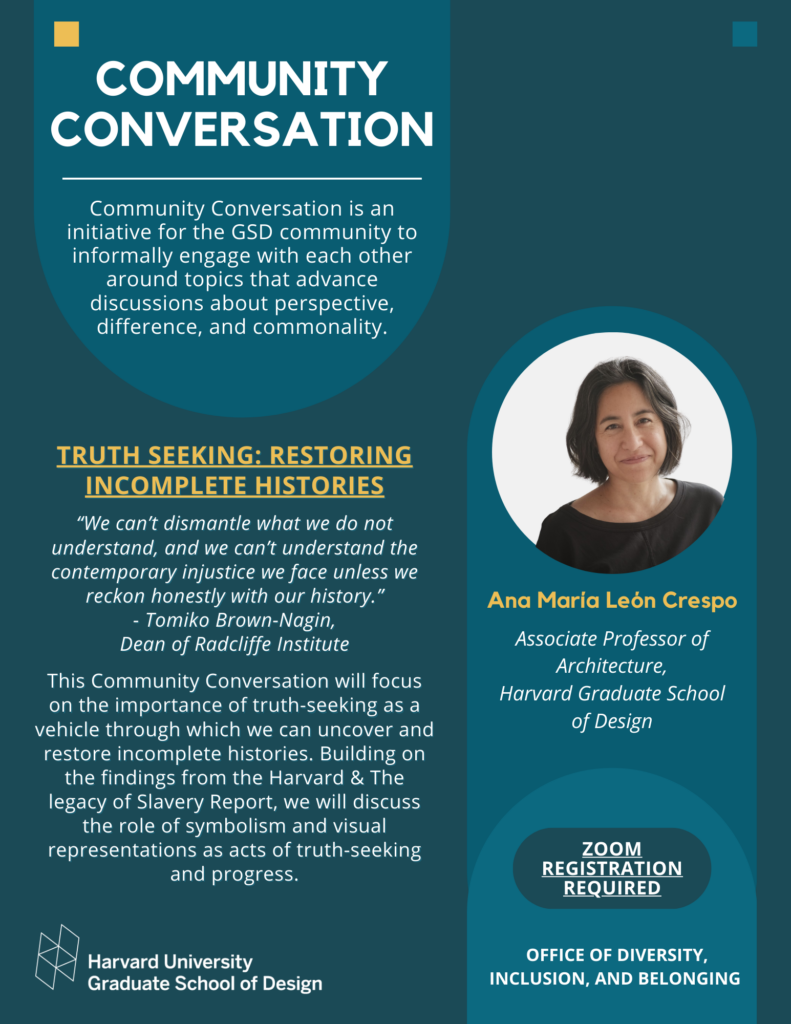
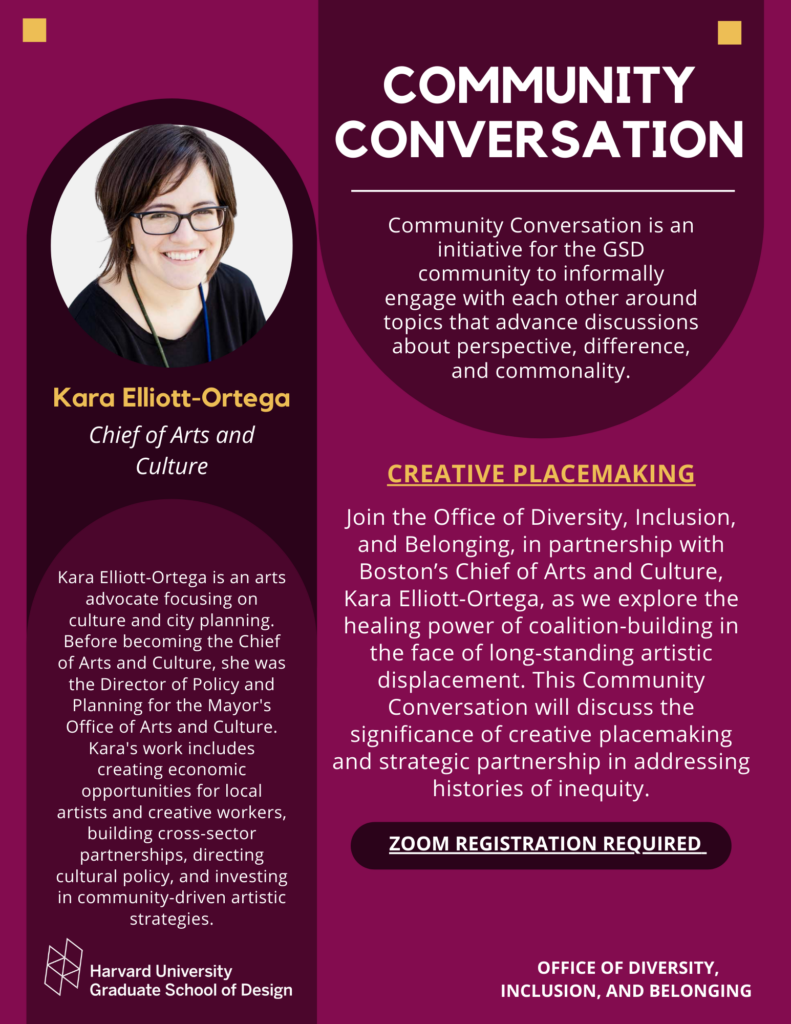
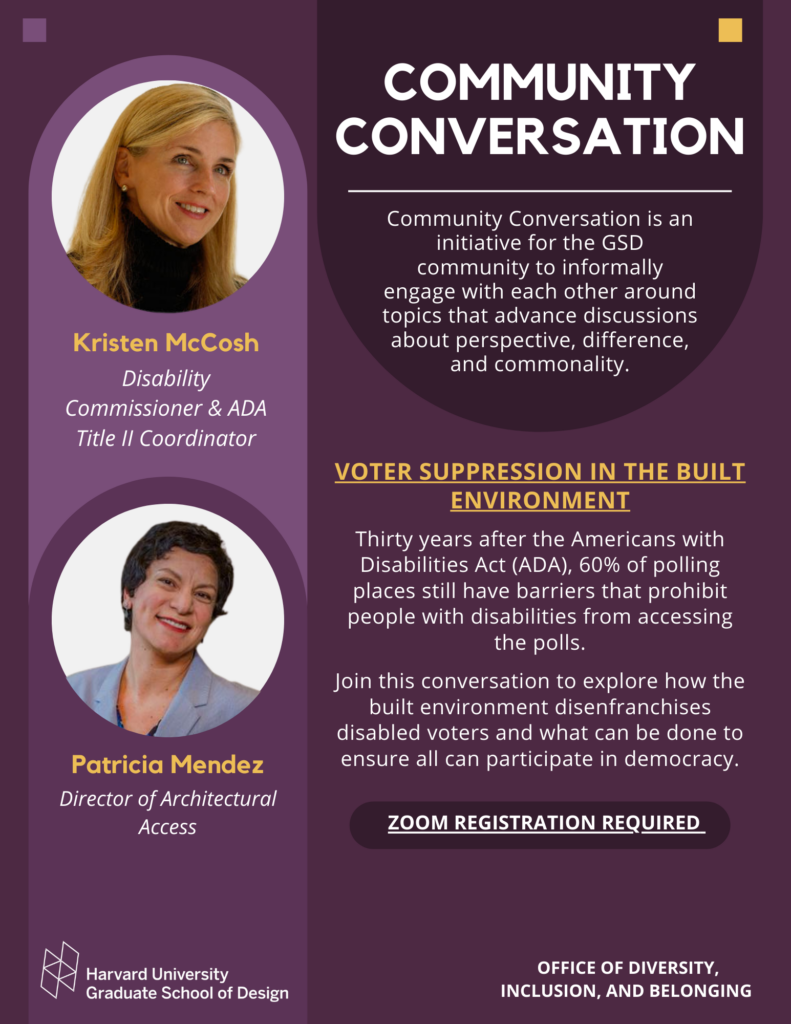
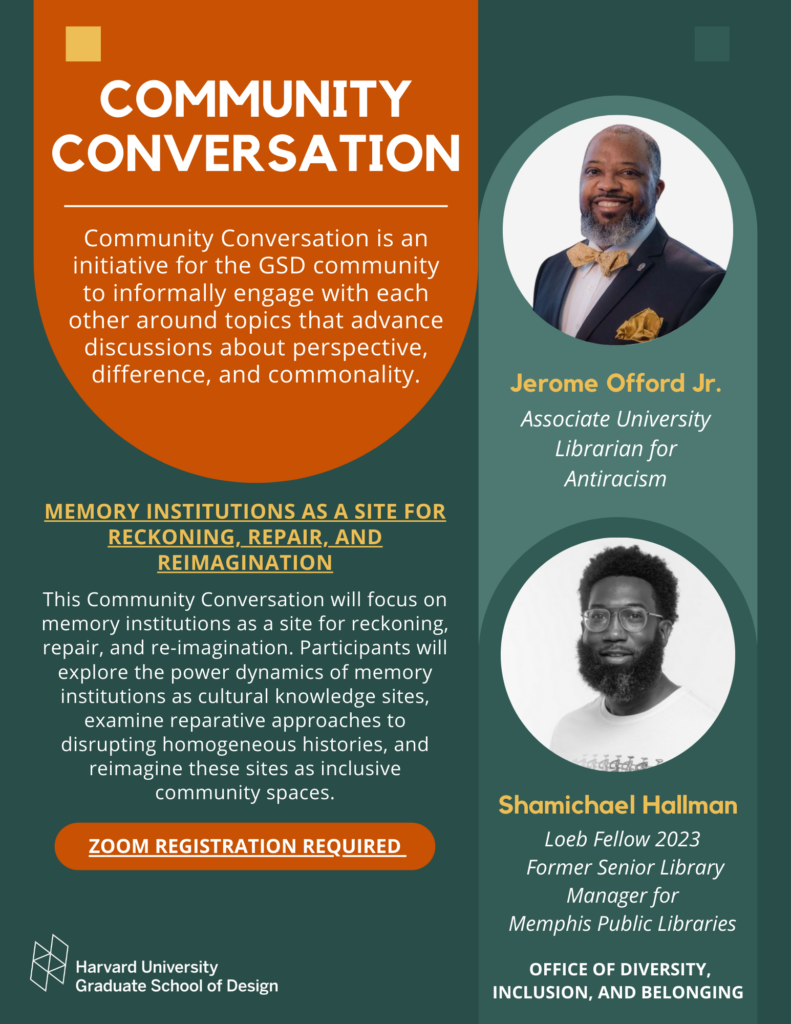
DIB Keynotes
DIB Keynotes serve as valuable opportunities for the community to enhance our understanding of Diversity, Inclusion, and Belonging by connecting with experts from the broader University community and beyond.
How We Hope: Lessons in Belonging from Social Movements
This insightful session with Professor James McCarty explored how movements for transformative justice and conflict resolution offer valuable lessons in fostering belonging within institutions. We learned how the concept of moral imagination can help us build structures that reflect our most deeply held values. By envisioning and integrating the future into our present, we use hope as a catalyst for change.
“Why won’t you listen to me?”: How to Engage in Productive Disagreements
In” ‘Why won’t you listen to me?’: How to Engage in Productive Disagreements,” Harvard University Kennedy School Professor Julia Minson delved deep into the dynamics and psychology of interpersonal disagreement. Together, we uncovered practical strategies for engaging in conversations that are often difficult, avoided, and feared.
Access Ain’t Inclusion
Drawing from his book, The Privileged Poor: How Elite Colleges Are Failing Disadvantaged Students, Dr. Anthony Jack discussed how university policies and cultures (i.e., hidden curriculum) perpetuate and exasperate inequities in the student experience and success.
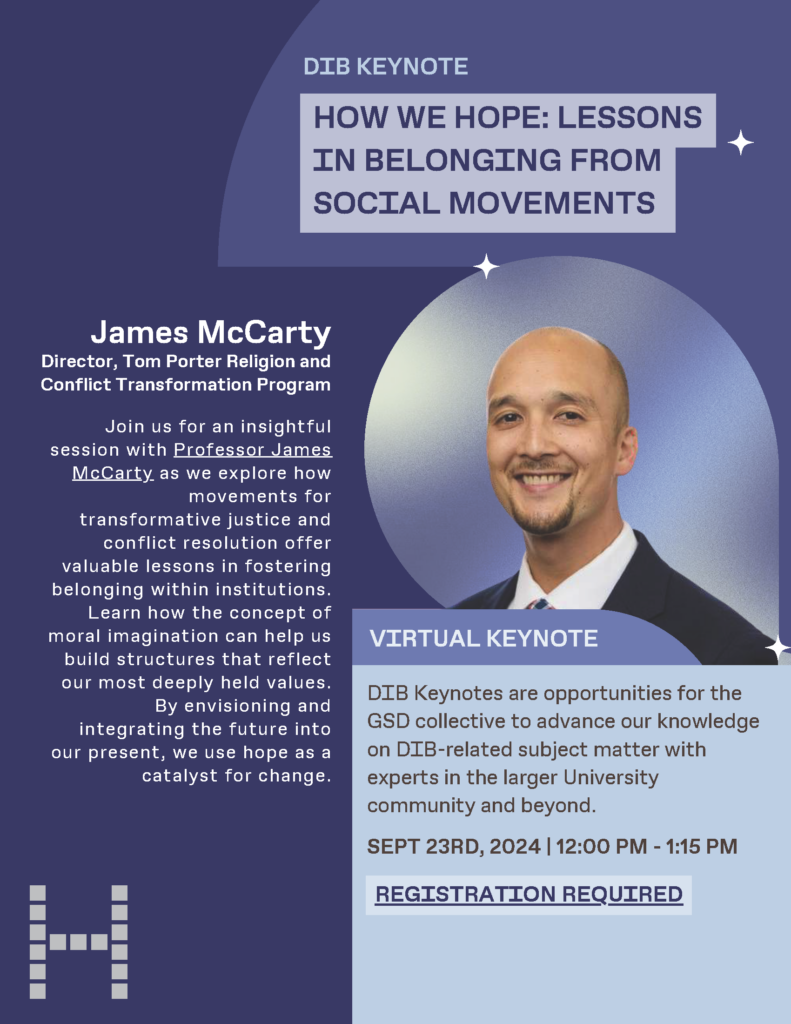
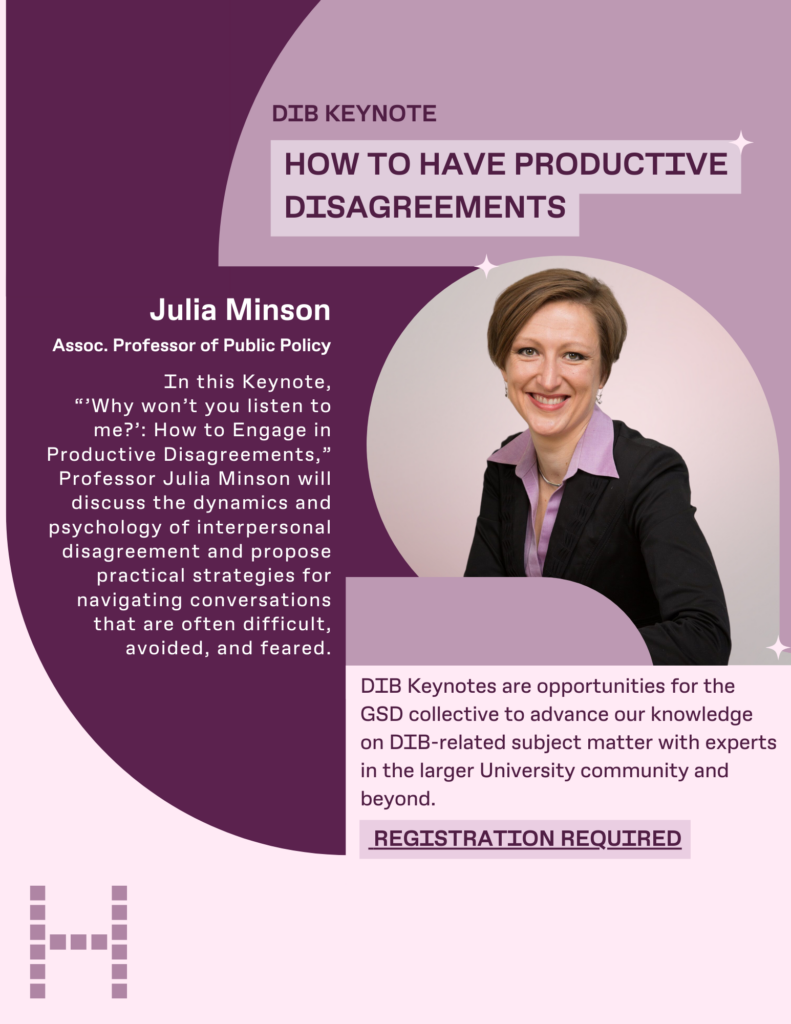
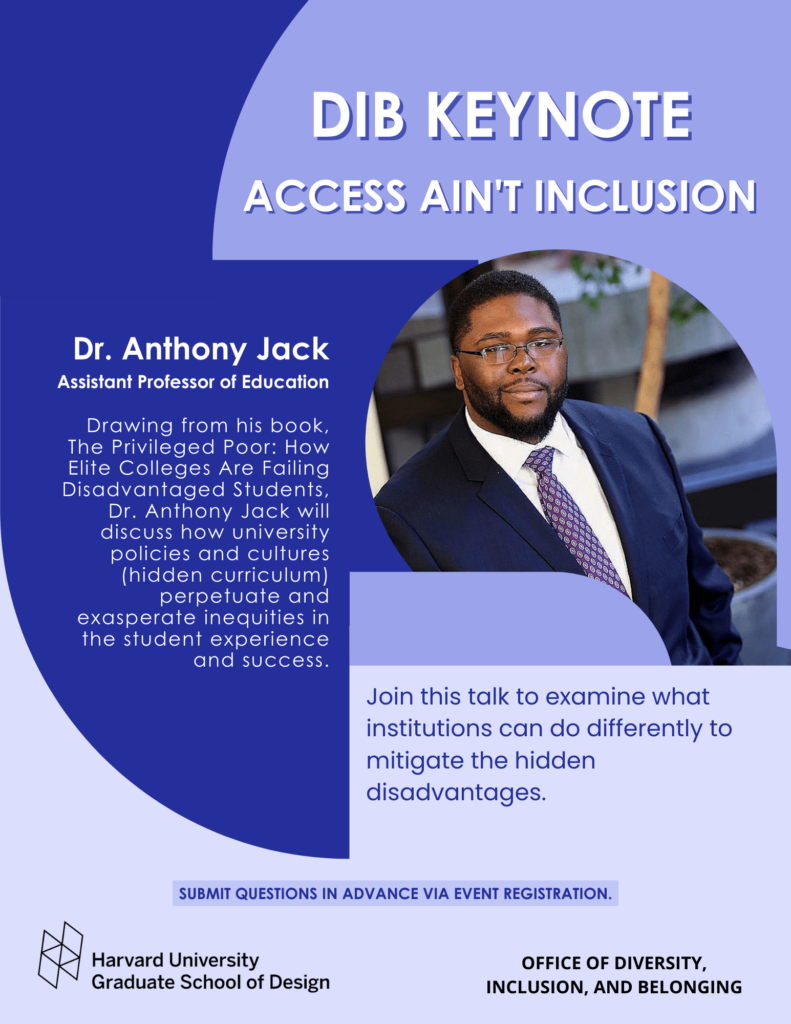
Program Recording Library
-
DIB Keynote | How We Hope: Lessons in Belonging from Social Movements
This insightful session with Professor James McCarty explores how movements for transformative justice and conflict resolution offer valuable lessons in fostering belonging within institutions. Learn how the concept of moral imagination can help us build structures that reflect our most deeply held values. By envisioning and integrating the future into our present, we use hope as a catalyst for change.
-
Community Conversation | Designing for Equity: Pryde in Aging
This illuminating session with Gretchen Van Ness (Executive Director of The Pryde) explored the need and complexities of establishing spaces dedicated to supporting specific identities in today’s polarized socio-political environment amidst these evolving challenges. This event focused on the design and development journey of The Pryde, Massachusetts' first LGBTQ-affirming housing for seniors, highlighting the unique challenges and solutions involved in its creation amid these shifting dynamics.
-
Community Conversation | Our Brains at War: The Neuroscience of Conflict and Peacebuilding
"Our Brains at War" explores the underestimated role of instincts and emotions in shaping societal conflicts and international wars, revealing unconscious influences that inform our preferences for leaders, drive militia recruitment, and even prompt violence. Drawing on Professor Fitzduff’s cutting-edge research, we'll discuss how understanding and managing these factors can pave the way for effective international and societal peace.
-
Community Conversation | Reimagining Black Wall Street: Economic Stability, Mobility, and Prosperity
In this Community Conversation, we unpacked how Black business districts came to be in the U.S. context and what contemporary requisites are essential for building a Black Wall Street today. We discussed the necessary economic and legal opportunities to counter declining Black wealth and explored how to transition from short-term wealth accumulation to lasting intergenerational resilience.
-
Community Conversation | Voter Suppression in the Built Environment with Commissioner Kristen McCosh
Thirty years after the Americans with Disabilities Act (ADA), 60% of polling places still have impediments that prohibit people with disabilities from accessing the polls. While the pandemic created inclusive voter engagement through absentee ballot drop-off boxes and curbside voting, there are currently more than 400 bills in 49 states that would restrict access to voting for people with disabilities. This conversation explored how the built environment disenfranchises disabled voters and what can be done to ensure all can participate in democracy.
-
DIB Keynote with Dr. Julia Minson | “Why won’t you listen to me?”: How to Engage in Productive Disagreements
How do people engage with opinions, judgments, and decisions that are different from their own? Does disagreement have to be divisive? In this Keynote, Professor Julia Minson discussed the dynamics and psychology of interpersonal disagreement and proposed practical strategies for navigating conversations that are often difficult, avoided, and feared.
Town Halls
GSD Town Halls are dynamic public spaces for discussion and reflection. Prioritizing emotional and mental wellbeing, GSD Town Halls promote collaborative relationships among faculty, staff, students, and researchers around current issues of policy and social inequity impacting our community at the domestic and international levels.
2020 Election
In advance of the 2020 presidential election, the Office of DIB hosted a town hall to create a space for community members to share their thoughts and concerns around the political landscape of the United States and the impact a shift in the leadership could have on the country and world.
Anti-Asian Racism
In the wake of several attacks against Asian Americans, the Office of DIB hosted a town hall focused on addressing Anti-Asian Racism by reaffirming our community values as an act of solidarity and providing an opportunity for the GSD community to connect, listen, process, and better understand each other.
